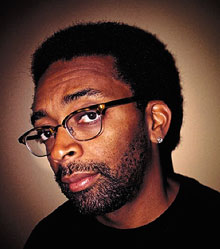  |
| HOME | THIS ISSUE | CALENDAR | GRANTS | BACK ISSUES | < BACK | NEXT > |
Event to showcase Harlem Renaissanceby Cindy Weiss- March 24, 2008 |
||||
| Political scientists, historians, artists, and philosophers will revisit the ideas of the post-World War I Harlem Renaissance in a conference at UConn from March 27 to March 29. The event, “The Harlem Renaissance Revisited: Politics, Arts, and Letters,” is organized by the Institute for African American Studies. Poet, playwright, and cultural critic Amiri Baraka, formerly known as LeRoi Jones, will open the conference on March 27 with a talk at 12:30 p.m. at South Campus Ballroom. Filmmaker Spike Lee, who is producing a documentary on the Harlem Renaissance, will deliver the keynote speech on March 29 at 7 p.m. at the Jorgensen Center for the Performing Arts. The Harlem Renaissance, which was centered in Harlem after World War I but also spread to other cities, was a period of intense artistic expression by African American writers, artists, and musicians. Lucy Hurston, niece of author Zora Neale Hurston, will speak on “Zora: Literature and Legacy” in a plenary session at 1 p.m. on March 28 devoted to iconic figures of the Harlem Renaissance. The session also includes talks by Jeffrey Stewart of George Mason University, biographer of writer and editor Alain Locke; and Ira Dworkin of Gettysburg College on poet Langston Hughes. Jeffrey Ogbar, associate professor of history and director of the Institute for African American Studies, calls it “a very ambitious, very exciting, very promising conference” that will stimulate discussion among a broad cross-section of artists and scholars. “It will force us to re-conceptualize the Harlem Renaissance itself,” he says. Subjects such as masculinity, class, “passing” for white, and the political activism of the 1920s New Negro movement were often taken up by Harlem Renaissance authors and artists. In 1921, Shuffle Along, a play with an all-black cast, was the most popular show on Broadway, Ogbar notes. Yet African Americans were not allowed in the audience of the Cotton Club in Harlem, which featured black performers. “The restrictions of white supremacy were pervasive,” he says, in the North as well as the South.
In revisiting the Harlem Renaissance, scholars will discuss whether it should continue to be seen as a unique outpouring of creativity, or whether it represents a continuity of expression that was seen by outsiders as a unique phenomenon, Ogbar says. During the conference, original editions of books by Harlem Renaissance authors will be displayed at the Dodd Center, and photos from the era will be exhibited at the William Benton Museum of Art. The 1925 film Body and Soul, starring Paul Robeson and directed by pioneering African American filmmaker Oscar Micheaux, will be shown on Friday at 6:15 p.m. at the Student Union Theatre, followed by a talk by Allyson Nadia Field of Harvard University on African American Cinema and the Harlem Renaissance. The conference is drawing scholars from around the nation, and graduate students and undergraduates primarily from the New England states. The College of Liberal Arts and Sciences is a co-sponsor of the three-day event, along with the Neag School of Education, the School of Fine Arts, the Humanities Institute, the African American Cultural Center, the Vice Provost for Multicultural and International Affairs, and the Student Union Board of Governors. Other co-sponsors are the Jorgensen Center for the Performing Arts and the William Benton Museum. For the complete conference program and more conference information, go to: www.iaas.uconn.edu/cfp.html To hear a podcast by Ogbar about the conference and the Harlem Renaissance, go to: www.clas.uconn.edu/podcasts/uploads/harlem_ren.mp3 For information about Spike Lee’s keynote talk, go to Jorgensen.uconn.edu/event_detail.php?eventID=92 |
| ADVANCE HOME UCONN HOME |

